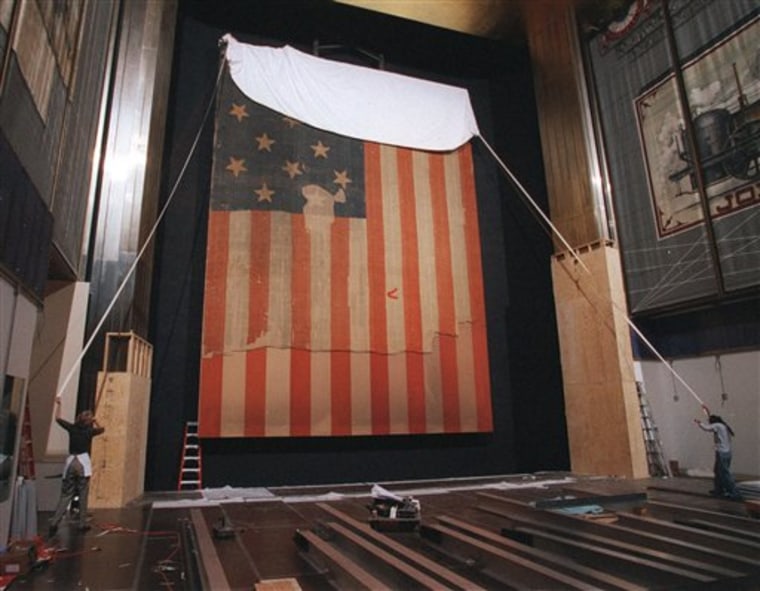As Hillary Rodham Clinton was leaving the White House, she asked Laura Bush first lady to first lady to continue one program if nothing else — the historic preservation program Save America's Treasures.
Mrs. Bush said she knew about the project and pledged to see it through.
Now, the grant program Clinton created that helped restore the original Star Spangled Banner, Rosa Parks' bus, President Lincoln's summer cottage in Washington and hundreds of sites across the country is on the current administration's chopping block.
"The unfortunate thing is we had no warning" the program was being wiped out of President Barack Obama's budget, said Bobbie Greene McCarthy, who has overseen the program at the National Trust for Historic Preservation and was Clinton's deputy chief of staff. "It was like being hit by a truck."
The program has paid out nearly $294 million over the past decade to more than 1,100 different sites and generated at least $377 million more in matching funds, according to the National Trust. The National Park Service administers the program, but the nonprofit trust is its chief advocate and helps coordinate applicants.
Historic preservation advocates have shifted into survival mode.
They argue the program, with its relatively meager federal funding of $30 million annually, has created more than 16,000 jobs across the country at a cost of about $14,000 each. They point out the White House's federal stimulus package is creating jobs at a cost of $248,000 each.
Earmarks cause trouble
At the same time, the program has become a favorite pot of money for members of Congress to fund pet projects through earmarks. Lawmakers have sent home money to restore small-town movie houses and county courthouses.
The earmark process may have sullied its reputation as the program's competitive, merit-based process could be bypassed with a willing congressional sponsor. It's also a tight budget year with shifting priorities.
Budget watchdogs have been critical of the earmarks for years because they say the process rewards political muscle, not project merit.
"That certainly makes it a less desirable program from a budgetary perspective because it means it's inviting waste into the system," said Steve Ellis, vice president of Taxpayers for Common Sense. "It's supposed to be competitively awarded. Why would you then reserve all this money that is then just a fiefdom of powerful members of the Appropriations Committee?"
The Office of Management and Budget said as much in its justification for eliminating the program. Save America's Treasures and a related program started by the Bush administration called Preserve America "lack rigorous performance metrics and evaluation efforts," the office said. And at least half the program's funding "is provided without using merit-based criteria."
National Park Service spokesman David Barna said the Interior Department is simply facing a tight budget and wants to reclaim the program's $30 million for priorities in national parks, which face a $9 billion maintenance backlog.
"I don't think it's fallen out of favor. It's just a matter of priorities," he said. "We all have to do as much as we can to reduce government spending."
The park service would still award $500 million a year in local tax credits for historic preservation, he said.
Advocates say that's not enough because grant money is critical in leveraging private support for restoration projects.
"If this program goes away, there is nothing to replace it," McCarthy said.
Surprise in heritage circles
Because the Obama administration has been generous to arts and cultural programs, it was surprising to see the preservation programs cut, said Richard Moe, president of the National Trust for Historic Preservation. Their contributions were cast in doubt without giving program managers a chance to prove the funding's impact, he said.
The group is pledging to strengthen and standardize the criteria used for grants awarded by congressional sponsors.
Last year, Rep. Jim McDermott of Washington sought a $250,000 earmark to help restore The Rainier Club, an elite Seattle social club with politically connected members. It was considered historic by local standards but wasn't recognized as "nationally significant."
The grant request wasn't funded after it drew media scrutiny, but it called into question whether other requests were granted by earmarks regardless of the criteria.
Part of the problem was each congressional office was setting its own criteria for the program.
"Up until a couple years ago, it was pretty haphazard," McCarthy said. "Frankly, I don't think they're necessarily abuses ... as much as just not recognizing what the program's requirements are."
Earmarks have been kept as part of the grant program to help promote diversity and geographical balance among applicants, she said. Otherwise, money would flow heavily to projects in the older Northeast states and less to sites west of the Mississippi River.
Some historic preservation projects have become economic engines, organizers said. The Colonial Theatre in Pittsfield, Mass., for example, was one of the earliest sites restored with help from a federal grant. James Taylor later recorded a CD there, and it continues to operate as a full-time performance space.
"I think it's very shortsighted for the program to be zeroed out," said Missouri Rep. Russ Carnahan, co-chair of the Congressional Historic Preservation Caucus. "We know preservation works and creates jobs."
The program's creator, now Secretary of State Hillary Rodham Clinton, has been informed of what's happening, McCarthy said. "I think beyond that, it's up to her," she said.
Advocates are calling on friendly ears on Capitol Hill and may try to reach current first lady Michelle Obama.
"I don't think it's too late," McCarthy said. "We're trying everything."
